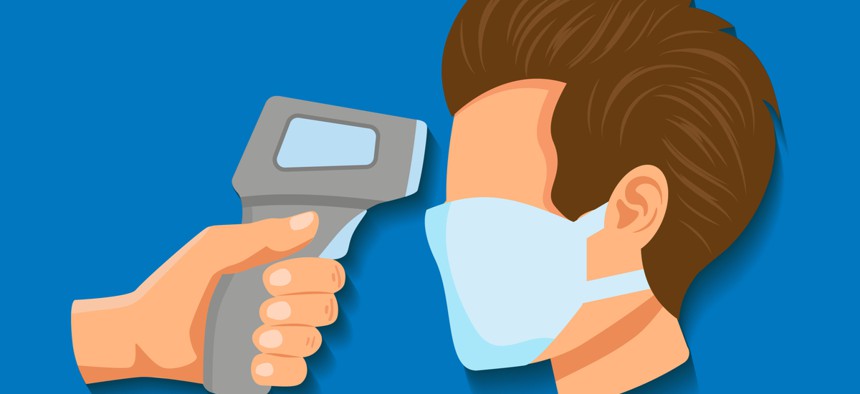FEMA Issues Solicitation For Temperature Screening Ahead of Plans to Reopen Two Facilities

Lelia Ledencova/Shutterstock.com
The winning vendor will need to supply protective equipment for their employees and contactless, infrared temperature scanning for FEMA personnel.
The Federal Emergency Management Agency is looking to reopen two facilities in Washington state and bring employees back to work once proper screening capabilities are put in place to test for COVID-19 infections.
In preparation, the agency released a solicitation contracting for temperature screenings beginning June 1.
While the current solicitation is only for two locations in Region 10—the American northwest, including Alaska, Idaho, Oregon and Washington state—the agency issued broad guidance on March 23 for reopening all of its facilities. That guidance includes where and how tests should be performed and what kind of technology should be used.
FEMA officials said the agency will be responsible for everything under the heading “Identify and Set Up a Screen Location” in the guidance, while the vendor will be expected to cover everything under “Procedures and Considerations for Screening.” Along with rules for how screeners should protect themselves and those being screened, the guidance offers a three-step process that should be followed:
- Step 1: Ask the person for permission before testing. “If the employee refuses, entry is not permitted, and the employee is to notify their supervisor for telework or alternate work location guidance,” the guidance states.
- Step 2: Perform the scan under predetermined guidelines.
- Step 3: If the person’s temperature is below 100.399 degrees, they will be permitted entry to the building and given a sticker or wristband for the day. If the person’s temperature is above 100.4 degrees, the employee will not be allowed to enter the building and will be instructed to contact their supervisor about working from home or other alternatives.
The solicitation is for two specific facilities in Bothell and Lynnwood, Washington, with one screener at each location at all times while the buildings are open.
“The contractor will be responsible to provide individuals that are ready to work and are willing to interact with the FEMA workforce,” through 12-hour shifts, seven days a week, the statement of objectives reads. The workdays are expected to run from 6 a.m. to 6 p.m., however, “the time frames might change based on operation requirements,” the solicitation states. “Flexibility needs to be maintained.”
Along with personnel, the contractor will be expected to provide all personal protective equipment—including masks and gloves—for the employees, as well as all necessary tools and supplies needed to conduct temperature checks. The devices used to check temperatures must be contactless, non-invasive infrared thermometers, according to the FEMA guidelines, and cannot include ear, oral or industrial type laser thermometers.
The vendor must also ensure there is ample hand sanitizer at the screening stations and alcohol sanitizing wipes to “disinfect the thermometer before first use, after accidental contact, and after taking the last measurement for the day.”
The contractor will also be expected to produce daily reports on the number of people screened at each location and “immediately report any combative individuals who refuse to be tested directly to FEMA security and the FEMA” point of contact.
The solicitation acknowledges that this is potentially hazardous work.
“No individual will be intentionally exposed to COVID-19, however, it is possible that a contract employee performing screening may discover an individual that is asymptomatic, but still infected,” the statement of objectives states.
The contract will run from the time of award—expected around June 1—until the pandemic threat has passed. Within that timeframe, FEMA reserves the right to “terminate part or all of services, adjust hours and days as necessary,” according to the statement of objectives.






